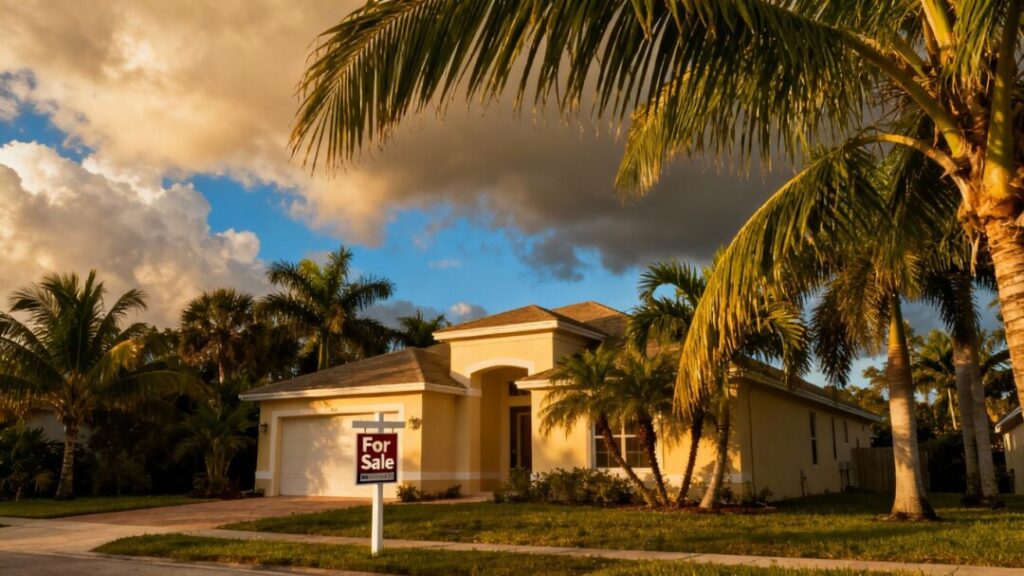Florida’s once-booming housing market is showing signs of a significant cooldown. Recent data indicates a slowdown in price growth, an increase in homes lingering on the market, and a notable rise in pending sales, prompting experts to warn of potential price declines in several key areas. This shift is forcing sellers to adjust their expectations and strategies.
Key Takeaways
- Several Florida cities, including Cape Coral, Lakeland, North Port, St. Petersburg, and West Palm Beach, are identified as having a high risk of price decline.
- Factors contributing to the market cooling include rising insurance premiums, increased inventory, and a general affordability crisis.
- While not a repeat of the 2008 crash, experts describe the current situation as a market correction or a "long, slow deflation of the bubble."
- South Florida, specifically the Miami, Fort Lauderdale, and West Palm Beach areas, is emerging as an "epicenter of housing weakness."
National Market Trends
The national housing market is experiencing a slowdown, with year-over-year home price growth dipping to 1.7% in June 2025, falling below the rate of inflation. This deceleration is leading to a transition period, with 20% of metropolitan areas recording price reductions, the highest percentage since 2012. This softness is particularly concentrated in southern and southeastern markets.
Florida’s Market Vulnerabilities
Florida’s housing market is particularly susceptible due to rapid price appreciation seen during the pandemic, coupled with escalating costs. Rising insurance premiums, which have increased significantly since 2020, are a major concern, making homeownership less affordable and deterring buyers. Additionally, in many areas, home prices have outpaced income growth for years, creating affordability challenges.
Cities at High Risk
Specific Florida cities have been flagged for their high risk of price decline. These include:
- Cape Coral, FL
- Lakeland, FL
- North Port, FL
- St. Petersburg, FL
- West Palm Beach, FL
These markets are experiencing factors like increased inventory, longer times on the market, and softening property values. For instance, Cape Coral has seen a notable decrease in median home prices and a rise in the average days homes stay on the market.
Impact on Buyers and Sellers
For potential buyers, this cooling market could present opportunities for negotiation and more accessible entry points. However, caution is advised due to ongoing economic uncertainties and rising ownership costs. Sellers, on the other hand, may need to adjust their price expectations and consider making property improvements, such as new roofs, to attract buyers and mitigate insurance costs. The overall sentiment is that while a full-blown crash like 2008 is unlikely due to different market fundamentals, a period of price correction and adjustment is underway.
Outlook
While the national housing market is projected to see modest growth, specific Florida markets are expected to diverge from this trend. The combination of high insurance costs, previous rapid appreciation, and increasing inventory suggests that these areas will likely experience further price softening. Experts advise informed caution and thorough due diligence for anyone involved in these markets.
Sources
- 5 Cities at High Risk of Price Crash, Norada Real Estate Investments.
- Florida’s housing market cools, forcing sellers to adjust, Gulf Coast News and Weather – Southwest Florida News.
- Lakeland, Florida is Second Most Risky Housing Market Poised for a Crash, Norada Real Estate Investments.
- Why is Cape Coral Housing Market in Florida Doomed to Crash in 2025?, Norada Real Estate Investments.
- This 1 part of
Florida is emerging as America’s ‘epicenter of housing weakness’ — expert warns of
‘really long’ bubble deflation. Will it spread to the rest of the US?, Moneywise.


